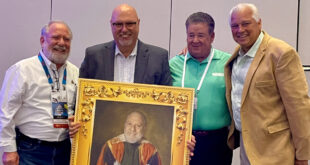
Chairman’s Message: The Winds of Change
No industry is immune to the winds of change. We live in fascinating times and in the short span of a score of years we have watched the birth of new industries and the demise of giants. The list of new endeavors is long, stunning, and amazingly quick. What the Internet has done to media, what Amazon has done to retail, what Uber has done to transportation, and what Google and wireless have done to everything are marvels of capitalism and creative destruction and change.
We are obviously not immune to these forces, but it seems to me our sprinkler industry has not been turned upside down by these technological changes. We have not been off-shored or had our business model radically changed by a new app. Clearly we communicate differently, we design differently, we track our jobs differently, and we have different products to suppress fire. But, at the end of the day, it is still people on ladders and lifts installing pipe and fittings. Our most basic and root activity is not terribly different than what we were doing 50 years ago. It seems unlikely that this most basic of our activities will change any time soon, but I would not underestimate technology and human ingenuity, even when it comes to fire.
Nevertheless, on many levels we have changed. At a recent gathering of contractors I asked the question how many of those present had some type of low-voltage division within their organization. Nine out of 13 contractors raised their hands. It was a revealing moment. Many of us are installing detection and releasing systems as well as fire alarm systems, and we have discovered the low-voltage world is broad and diverse and touches on scopes of work that many sprinkler contractors never dreamed of years ago. In 2017 it is not unusual to hear of our peers installing not only fire alarms but security, video, card access, and nurse calls. Companies that, at their core are fire sprinkler contractors, are morphing into diverse organizations that are logically capturing additional scopes of work that was unusual ground just 20 short years ago.
Our mission at AFSA has always been clear – to represent the interests of merit shop fire sprinkler contractors. For 36 years that mission has not changed, but many of us have chosen to change our companies’ offerings, and today AFSA represents many merit shop sprinkler companies that have successful and thriving merit shop low-voltage divisions. Low-voltage work is not for everyone, but the trend that many of us are pursing must be recognized.
 Michael Meehan is Chairman of the AFSA Board of Directors.
Michael Meehan is Chairman of the AFSA Board of Directors.

 Sprinkler Age A Publication of the American Fire Sprinkler Association
Sprinkler Age A Publication of the American Fire Sprinkler Association
